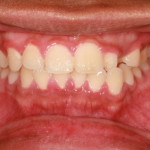It can be scary to brush your teeth and realize that you have bleeding gums. Not everyone knows what you should do if your gums are bleeding. It’s a good idea to know how to handle the situation so that you’re prepared if it happens to you.
Bleeding gums can be a sign of gum disease, so it’s a good idea to make an appointment with your dentist as soon as you notice the problem. When it comes to gum disease, it’s best to start treating issues as soon as possible. This can keep a little problem from growing into a big one.
In the meantime, there are a number of things you can do to help your bleeding gums. Drink lots of water, and avoid food and drinks that are extremely hot or cold. These things can cause further damage to your gums.
You may want to make some additional dietary changes. For example, it’s a good idea to eat foods with vitamin C. This will encourage your gums to heal. You should also start eating more teeth-healthy foods like carrots, apples, and string cheese. This will help keep further problems from occurring.
In addition, focus on brushing your teeth thoroughly at least once a day. Follow up that brushing with a good flossing. The better you care for your teeth, the easier it will be for them to heal up. If you normally use mouthwash, you may want to stop until your bleeding gums are addressed.
Gum bleeding can become a serious problem, but if you treat it right away, you’ll be fine. Make sure you see a dentist in Baltimore as soon as you can, and work hard to care for your teeth in the meantime. You should make a full recovery.

 Gum disease is a condition of swelling, soreness and infection of the tissues supporting the teeth. A dentist will screen your gums during a routine dental examination. Gum diseases are divided into two categories such as gingivitis and periodontal disease. Inflammation of the gums is referred to as gingivitis. The gums around your teeth will become red and swollen during this condition. The gums will bleed while cleaning or brushing your teeth. Untreated gingivitis can result in periodontal disease.
Gum disease is a condition of swelling, soreness and infection of the tissues supporting the teeth. A dentist will screen your gums during a routine dental examination. Gum diseases are divided into two categories such as gingivitis and periodontal disease. Inflammation of the gums is referred to as gingivitis. The gums around your teeth will become red and swollen during this condition. The gums will bleed while cleaning or brushing your teeth. Untreated gingivitis can result in periodontal disease.